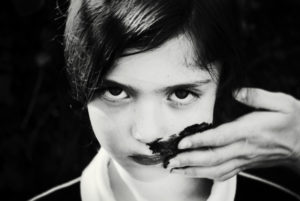You have no items in your cart. Want to get some nice things?
Go shopping It was an outer smoothness of metal weight that came in with the quiet child that evening. It damned a pulse in her pocket as she undid herself from boots and a scarf. It beat and she knew what she had to do, in the kitchen with a telephone bulkily waiting.
It was an outer smoothness of metal weight that came in with the quiet child that evening. It damned a pulse in her pocket as she undid herself from boots and a scarf. It beat and she knew what she had to do, in the kitchen with a telephone bulkily waiting.
But she would not go yet. Instead she remained with a wall for defence, where her sister was a creature in a knot under blankets. She pulled at a fold and a foot curled back. Beside the blankets were castaway things, a rucksack and paper, and a hat that was smeared where it should have been yellow. She knew that ice had been warmed inside because her sister would often cocoon the cold, or try. The smell of the stain was ugly and spread, and soap would be needed before it was noticed.
The sister herself was untainted, otherwise. She could ask her if she knew what had been said. If cries had carried in hallways in the hours before the bell. Of course they had, and even if not, the whispers that followed the cries would have travelled. There was no one who had not sneered with the crowd, or pointed at and mimicked the bodily contortions. The quiet child knew this and she did not need to ask. Panic was leapt upon. Panic was relished.
Roll up your hat inside your shirt when you put it in the wash. That way you can’t even see it, said the quiet child.
Or smell it, said the knot in the blankets.
Or smell it, said the quiet child.
Anyway, you’re the one in trouble, said the blankets, and with a dragging and turning, part of a face. Someone came up and I heard them talking, and she said she would have to have a word with you later.
The quiet child paused as she levelled with the doorway.
She’s out but she’ll be back, said the sister. Then she’s leaving again but she’ll speak to you first.
*
The kitchen now, but still not the telephone, despite the dense pressure in the quiet child’s hand. A number first to be found in a list. Pages were edging tired from their staples, and in black and white were names and the numbers. Columns of other people that the quiet child found satisfying, without any anchor or impulse before. She found the page and line she needed, and held them, and then looked out at the hotel across the river. It was a building pieced together with windows and from the shapes it was clear where the lift shafts were. The river was frozen and thick below. The quiet child dialled and listened.
Hello? said her ear.
Hello? she said back.
Hello? Who is this? the ear voice said.
The quiet child gripped at the ache in the pocket. I’m looking for Veronika, she said. This was wrong but the words were too fast. Can I speak to Veronika, if she’s there? she said.
Breathing into open silence over something stifled, further away.
No, said the voice. Not now. I don’t think. She can’t come I don’t think just now. Who is this anyway? I’ve asked and now I’m waiting.
From school, said the quiet child. I’m in her class.
Right, said the voice. This isn’t. I think.
I can ring again later, the quiet child said.
More sounds that weren’t the voice and next: Listen. Later. Later, if you can. But not too late. Can you make sure of that?
Then the voice was gone and the low note began. The quiet child left the hum in the phone, and the view outside in the frame and near dusk.
*
The screen was on now but blindly because the blankets were over the face again. There was anger in microphones and overlapping, and the quiet child heard halves of what was said and argued. A block like any other had fallen, into the car park and concrete below. Explosives had been found in sacks in a basement. But not explosives, perhaps, after all, with shouts that the powder was sugar and harmless. An ambulance where the block had collapsed, sirens and women. But this was not where the sacks were uncovered. This was a city that looked just the same. The quiet child ignored the screen. She pushed to make it blank.
*
A click for an arrival. The quiet child’s mother, for as long as it would take to wear new shoes and two new lips.
There’s something we need to discuss, she said. Just quickly, before I have to go. Can you untangle this, as well?
The quiet child took the necklace and the twist was easy, just thread in the smallest pieces of glass.
Does this ring any bells? said the mother. A set of keys gone missing. You were out with her yesterday, weren’t you? You were. Her parents say she’s lost them.
I know, said the quiet child. I know she lost them but I don’t know where they are. If they fell out of her coat they’ll be under the snow. But I don’t know. I never saw them.
If you think of something, just tell me, said the mother.
The quiet child nodded. A catch was unlinked in her fingers but she tied and the trails of ends were hastened together. There, she said.
Thank you, said the mother. Be good and don’t go out to the lifts, and we’ll see you in the morning. And don’t pick at your nails. Be good.
*
The quiet child waited for clicks again. When they came she returned to the page, and she buttoned each number in the order to follow. There was no voice. Only blanks that were evenly spaced in her ear. Not late enough, or else too late. Most likely still not late enough.
*
Were you using the phone? said her sister, checked in new blankets in the room already darkened to lie in.
No, said the quiet child. Only for emergencies.
Is this an emergency? You look like emergencies. You look like one, said her sister.
No, said the quiet child. It’s nothing important.
*
The quiet child studied unplugging and sockets. Replugging then, by a bookcase a window her own. The lights or eyeholes, red and green jumping, she read to know that the wires were right. Water in pipes in the wall behind as she numbered again and no answer came. Water in channels for other lives. She imagined someone, not so near, noticing a necklace still connected, but loose with something missing and wrong. And somewhere else there had been a body in a corridor, blaring and pounding, in the middle of stares.
*
The voice, at last, and not before thumb skins stripped to show blood. Hello? said the voice.
It’s me, said the quiet child. From before. I rang. From Veronika’s class. I rang before.
It’s you, said the voice. I’m tired as hell. You’re still awake then?
Yes, said the quiet child. Can I speak to her now?
Veronika, said the voice. She’s my niece. I’m her aunt. I’m just staying to help but I’m leaving next week.
The quite child’s fingers in five wraps of coil from the phone, then six.
She’s here but she’s sleeping, said the voice of the aunt. I can’t wake her up. She needs the rest.
I needed to speak to her, the quiet child said.
Something happened to Veronika today that made her very scared. Is this about that? said the voice of the aunt.
I didn’t know scared, said the child. I thought angry. She’d lost something but there was nothing to be scared of. I thought she was angry. Everyone saw her.
She was scared because of what she lost. That’s why, said the voice of the aunt. Then: Can you think of something that makes you feel safe?
Oh, said the quiet child and the voice had to wait. There are bars on the windows, the quiet child said.
Something else, said the aunt. Or no. Tell me that.
We live on the thirteenth floor up, said the child.
Right, said the voice of the aunt. And do you think that your bars keep people out as well as in?
No, said the quiet child. No one climbs here. Only birds.
The breath that came now was slow through the wires. But what about your family? Your friends, said the voice of the aunt.
Oh, said the child. But not like the bars. And I needed to speak to Veronika, if she’s there.
She’s sleeping, said the voice of the aunt. I told you. But what did you want to say to her?
There something I wanted her to know, said the child.
That’s what I mean, said the voice of the aunt. Quickly though, if you don’t mind.
The quiet child had traces deep, four clean corners and an arc still digging.
I did something, she said. It was a thing I didn’t plan to do.
Right, said the voice of the aunt.
We were out on the balcony, the quiet child said. Two girls that live in our block, on two of the floors below.
Right, said the voice of the aunt.
We were sliding the snow off the railing so it dropped, but some of it was frozen on, said the quiet child. And one girl had her keys because she said her parents trusted her. She thought she had to carry them everywhere on the string around her neck. She took them off to show us and I asked if I could have them.
The keys? said the voice of the aunt.
I had an idea that I wanted to try. I was swinging them up on the string, said the quiet child. I wanted it to look like I was throwing them over. But I wasn’t swinging them hard enough, on purpose, so when I let go they didn’t reach the railing. They just fell before the railing and I caught the last bit trailing of the string.
You threw them but they didn’t go over? said the aunt.
The problem was I did catch the string but I dropped it as soon as I caught it, said the quiet child. They fell through the gap between the balcony floor and the bottom of the railing. They fell but I didn’t throw them.
I see, said the voice of the aunt.
We went down to the car park to find them but there was too much snow to see. She had to wait outside her door for someone to let her back in. She cried, said the quiet child.
Did you throw the keys to impress your friends? said the voice of the aunt after breath, again.
I didn’t mean to lose them, said the quiet child. I didn’t mean for them to fall.
So you wanted me to tell Veronika about the balcony and these keys? said the aunt.
No, said the quiet child. Not any of that. Just that maybe someone took what she lost today but maybe they didn’t mean to, either.
How do you know someone took it? said the aunt.
If you can just tell her, the quiet child said.
*
The small white cube on the longer of the cords hit sharp against a tile before the kitchen. The quiet child knew that her sister would come. She snapped the wires back to where they fit in time and closed the pages over the number. But she was still near the window in the kitchen where she shouldn’t.
Why were you using the phone again? said the quiet child’s sister in shadows.
I wasn’t, said the quiet child.
I heard you, said the sister.
I was trying to speak to someone but there was only someone else, said the quiet child. I was trying to speak to Veronika but I couldn’t.
Why? said the sister. I thought you didn’t like her. You said she was a freak of nature, once.
But she lost something, said the quiet child.
I know, said the sister. Everyone knew because she was screaming.
No one else even uses a padlock, said the quiet child. All there is in the lockers are books and our jackets and gloves for outside. No one else ever puts a padlock on. It makes you look insane.
She is insane, said the sister. She talks to herself and everyone knows. What did you ring her for?
It was probably just a mistake, said the quiet child. She might have thought someone stole it to make her angry and to see what she’d do. I wanted to tell her it was probably a mistake. Someone could have picked it up and taken it by mistake.
We thought maybe someone stole it, said the sister.
I said it was just a mistake, said the quiet child. And I think you should go back to bed now.
I can’t, said the sister. I’m scared.
Don’t be scared, said the quiet child. I’m here.
*
The quiet child opened the door and was careful to swallow the click of it. She pressed for the lift and stepped inside. The slide to shut was dull, reflected twice in the mirror behind. In this flash of reversion she caught herself: a quiet child but a mock-quiet child, a lying child and a poison child. Suspended in solid, then pressing again, and out, and up to the right. To the space that was last, just short of fourteenth, where the stairs continued but the lift was not built for, and this was the dust at the very top, where no one lived because thirteen was the end. The piping and tubes like mangled trunks, with cloth around the bends and hanging in rags. Her shredding, too, was like this on her thumbs if she looked down. The pipes were dangerous, she had been told. And the icicles through the bars outside were the meaty width of arms and legs. They stabbed air for now but would rip into flesh themselves if they fell too soon. Before there was time to drip and diminish. As long as the winter stayed cold they were safe.
The quiet child would remember only in distance when she left this place. In a country where something like sugar caused burning, she would remember the downward spears of ice laid out jagged, and the upward points of a towered hotel. She had a hollow that she had hidden in her palm, and inside there were pins that would never be raised. She would be punished and deserve whatever would come: this she would always remember.
Join us this summer for the 8th edition of the Litro World Series Summer Literary & Arts Festival Get Tickets Here

About Han Smith
Han Smith is a writer, reader, translator, sort-of-teacher and definite learner, currently quite interested in distance, tides and unbodying. Published by Litro Magazine and Liars' League and selected for the Spread the Word 2017/18 PLATFORM programme for emerging writers.



